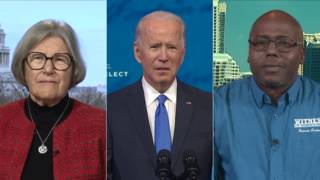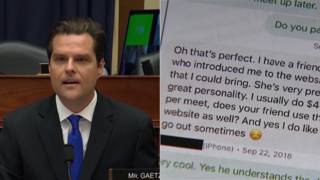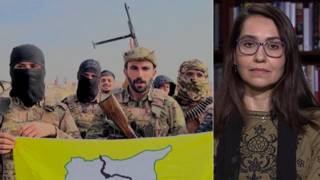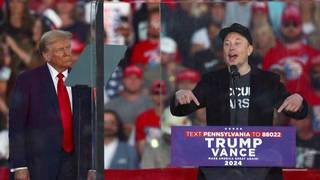
Related
Guests
- Rashid KhalidiEdward Said Professor of Arab Studies and the director of the Middle East Institute at Columbia University. His new book is called The Iron Cage: The Story of the Palestinian Struggle for Statehood.
- Ali AbunimahAli Abunimah*, creator and editor of The Electronic Intifada and, more recently, Electronic Iraq. His new book is One Country: A Bold Proposal to End the Israeli-Palestinian Impasse.
Two leading Palestinian-American intellectuals discuss their new books: Rashid Khalidi’s “The Iron Cage: The Story of the Palestinian Struggle for Statehood” and Ali Abunimah’s “One Country: A Bold Proposal to End the Israeli-Palestinian Impasse.”[includes rush transcript]
Transcript
AMY GOODMAN: We turn now to the latest from Israel and the Palestinian territories. But first, an unusual moment last night on American television. Appearing on CNN’s Larry King Live, a former U.S. president and leading Middle East peacemaker fiercely critical of Israel’s occupation of the West Bank and Gaza. He was talking about his new book, “Palestine: Peace Not Apartheid” which is generating heavy controversy here in the United States.
JIMMY CARTER: And the oppression of the Palestinians by Israeli forces in the Occupied Territories is horrendous. And it’s not something that has been acknowledged or even discussed in this country. The basic problem—
LARRY KING: Why not?
JIMMY CARTER: I don’t know why not. You never hear anything about what is happening to the Palestinians by the Israelis. As a matter of fact it’s one of the worst cases of oppression that I know of now in the world. The Palestinians’ land has been taken away from them. They now have an encapsulating or an imprisonment wall being built around what’s left of the little tiny part of the holy land that is in the West Bank. In Gaza, from which Israel is now withdrawing, Gaza is surrounded by a high wall. There’s only two openings in it—one into Israel, which is mostly closed, the other one into Egypt. The people there are encapsulated. And the deprivation of basic human rights among the Palestinians is really horrendous. And this is a fact. It’s known throughout the world. It’s debated heavily and constantly in Israel. Every time I’m there, the debate’s going on. It is not debated at all in this country.
AMY GOODMAN: That was, of course, former President Jimmy Carter, speaking on CNN’s Larry King Live. And he was talking about his new book; it’s called Palestine: Peace Not Apartheid. It’s generating heavy controversy here in the United States.
Carter’s comments come as Israeli Prime Minister Ehud Olmert gave a major address Monday in which he said he was prepared to offer Palestinians concessions to make peace. Olmert said Israel would return parts of the West Bank towards the creation of a Palestinian state. He called on Palestinians to renounce violence, give up the right of return and accept a prisoner exchange for the captured Israeli soldier Gilad Shalit. Olmert’s comments marked the first time he’s endorsed the idea of a prisoner exchange since Israel launched its attack on Gaza in June.
Olmert did not give new ideas on some of the most contentious issues, including Israeli settlements and the status of Jerusalem. But he said peace would be based on the Bush administration’s position that any new agreement would reflect the reality of Israel’s annexation of large parts of the West Bank for its settlements.
Olmert’s speech comes one day after Israel pulled out of the Gaza Strip as part of a new ceasefire. Israel’s five-month offensive in Gaza has killed more than 400 Palestinians, including at least 74 under the age of 18. Fighting continues in the West Bank, where Israeli forces arrested 13 Palestinians overnight.
Well, today we’ll spend the rest of the program with two leading Palestinian-American voices. Both have new books on the Israel-Palestine conflict. Joining me here in our firehouse studio is Rashid Khalidi. He’s the Edward Said Professor of Arab Studies and the director of the Middle East Studies Institute at Columbia University. His new book is called The Iron Cage: The Story of the Palestinian Struggle for Statehood. We welcome you to Democracy Now!
RASHID KHALIDI: Thanks for having me, Amy.
AMY GOODMAN: It’s good to have you with us. First, your response to this former U.S. president, Jimmy Carter, and his book?
RASHID KHALIDI: Well, I certainly couldn’t agree more with what he said on CNN last night. There’s no question but that there’s been a blanket of silence for 39-and-a-half years and running, in most of the mainstream media, about what is happening daily in the Occupied Territories. The very fact that they are occupied territories and that it’s been 39-and-a-half years is never, never mentioned in most news reports.
AMY GOODMAN: The fact that he’s an American president talking about this, is this unusual?
RASHID KHALIDI: Well, that’s why he got on Larry King. It’s very, very hard to get those kinds of words across something like CNN. It is important. I mean, this is a man who’s gone around the world and, I think, very ably represented this country in terms of standing at elections, watching them, supervising them. And I think he’s a man who has enormous credibility, though it’s amazing how the Democratic Party is twisting and turning on the issue of his book.
AMY GOODMAN: Why—why do you think that is, the Democratic Party?
RASHID KHALIDI: Well, the politicians who have disassociated themselves from President Carter are all Democrats, interestingly enough.
AMY GOODMAN: Who?
RASHID KHALIDI: I can’t remember each specific senator or congressman, but there was a lemming-like rush away from the president on the part of a number of them, I think because anything that’s said against Israel arouses enormous, ferocious emotional response among some people, and politicians are afraid of that. The media are afraid of that. And so, I don’t think that we get anything like a balanced discussion of the issues. In fact, a discussion of the issues is what many people would like to avoid. And I think that that’s what the president himself said. We don’t have these things discussed in this country. They certainly are in Israel, as he said. They’re discussed everywhere else. They’re just not discussed here.
AMY GOODMAN: Why did you call your book The Iron Cage?
RASHID KHALIDI: I called it The Iron Cage because that was the metaphor that occurred to me in trying to explain the kind of constraints that the Palestinians operated under during the mandate period. And then I realized that’s still true today, in a sense. They are within, bounded within, both physical and constitutional and legal constraints that make it, very, very hard for them to operate. The focus of the book is not on that, however; it’s on what they have done or not done within those constraints.
AMY GOODMAN: Talk about Ehud Olmert’s speech and what he is offering, in the context of—and I think, as you say, without this discussion, people don’t even understand the history.
RASHID KHALIDI: Right.
AMY GOODMAN: In the context of the history, as you talk about the story of the Palestinian struggle for statehood.
RASHID KHALIDI: Well, there’s deep history, and there’s current history. The current history is 39-and-a-half years of occupation. The deeper history, which I try and go into in this book, has to do with what happened before 1948, in 1948 and since. The problem doesn’t just go back to 1967. So, what Olmert is talking here about is a rearrangement of the current status of the Occupied Territories, with Israel, as you said, keeping much of what it occupied in 1967, what President Bush in April 2004 basically granted Israel, the so-called settlement blocs, which are undefined areas which cut the West Bank into at least three pieces, but which could expand—continue to expand, as they have been over many, many years. So there’s nothing new in the proposal, as far as I can tell. And it essentially involves a rearrangement of the status quo before 2000.
AMY GOODMAN: Well, go back. Go back in time. We have time for this. Talk about the deep history.
RASHID KHALIDI: Well, the deep history has to do with a country that had a majority that was Arab, in which the British helped the Zionist movement to establish what was called in the Balfour Declaration a national home for the Jewish people. That was understood by the British and by the Zionists to mean a Jewish state in all of Palestine. And that was—that was the objective, I think, from the beginning.
What nobody really took very seriously into account was that Arab majority, the fact that it had a national consciousness, that it saw itself as having rights, and that even by the documents that the British themselves had helped to produce, the Covenant of the League of Nations, that population did have rights, a right of national self-determination. What I talk about in the book is how that right was never granted, how the Palestinians were never able to achieve it, how obstacles were thrown in their path.
And then 1948 involves the expulsion of a majority of the Palestinians from their homes. It involves the establishment, obviously, of Israel, but the non-establishment of an Arab state, which the United Nations had called for. And I go into why that happened, as well.
AMY GOODMAN: The difference between the British rule and the Israeli rule?
RASHID KHALIDI: Well, there are some similarities. The emergency regulations that the British passed in 1945 are still applied for things like administrative detention, an innovation which our law now includes in the form of the Military Commissions Act, where you can just be put in jail on the say-so of some government official. So, there are obviously other differences. The British pretended that they were trying to fairly judge between the two sides. In fact, they had a very deep commitment to Zionism. It was only tempered in 1939, when they came to realize how impossible it was to ram the Zionist project down the throats of the Palestinians and the rest of the Arab world.
AMY GOODMAN: How did the Israelis expel the Palestinians?
RASHID KHALIDI: By force, by fear. In many cases, people fled without actually having been attacked, out of terror, after hearing of massacres or reports of massacres elsewhere. It was absolutely necessary that 55 percent of a country that had a 65 percent Arab majority, which was to become a Jewish state under the Partition Plan of 1947, that 55 percent had almost parity between Arabs and Jews. You wouldn’t have had a Jewish state in that 55 percent, unless that population, or large part of it, had been expelled. So, moreover, most of the property in that—in that 55 percent was Arab-owned. So, it was almost a necessary and inevitable prerequisite for the establishment of a Jewish state in a country that had 65 percent Arab majority.
AMY GOODMAN: What about your family’s own story?
RASHID KHALIDI: Well, I mean, my family comes from Jerusalem, my father’s family. Some of the members of my family were involved, deeply involved, in politics. One of them was—I mention him and others in various of my writings—played a pretty important role in the '30s and ’40s. I'm critical of that whole generation of leadership in the book, because I think they really failed to meet the challenge that they faced. But I—
AMY GOODMAN: What do you think they should have done?
RASHID KHALIDI: Well, there are many things that they should have done. One thing that they should not have done is to react the way they did to the British. The British came there and put into place a series of constraints that they should not, under any circumstances, have accepted. Many of them, not just the Mufti, not just my uncle, not just a number of other people, accepted positions in a British mandatory administration, which was predicated on the denial of their national existence. That was a mistake, obviously. They made many other mistakes. I mean, there was only a moment in which a compromise might have been possible with the Zionist movement, when it was weak, late '20s, early ’30s. They didn't take that chance. There was only a moment when real resistance to the British might have changed things, as it did in Iraq, in Egypt, in Syria—in the '20s. The Palestinians didn't revolt ’til the end of the ’30s.
AMY GOODMAN: Why?
RASHID KHALIDI: And it was a popular revolt. That’s a hard question to answer. I mean, I actually don’t answer it in the book, because I’m not sure why. Everywhere else, you had major armed national revolts against colonial imperial rule, not in Palestine, until the very end of the ’30s.
AMY GOODMAN: We’re talking to Professor Rashid Khalidi. He’s the Edward Said Professor of Arab Studies at Columbia University, author of a number of books. His latest is called The Iron Cage: The Story of the Palestinian Struggle for Statehood. When we come back, we’ll also be joined by Ali Abunimah. He has also written a book, a controversial bold proposal, and that is One Country. Stay with us.
[break]
AMY GOODMAN: Tom Waits, “Road to Peace,” here on Democracy Now!, democracynow.org, The War and Peace Report. Our guest in studio here in New York is Professor Rashid Khalidi. His latest book is called The Iron Cage: The Story of the Palestinian Struggle for Statehood. Joining us in studio in Chicago is Ali Abunimah. He is the creator and editor of The Electronic Intafada and, more recently, of Electronic Iraq. His new book is called One Country: A Bold Proposal to End the Israeli-Palestinian Impasse. Ali Abunimah, thank you for joining us. Lay out that proposal, please.
ALI ABUNIMAH: Thank you, Amy. What I lay out in the book is really an old idea, which I think needs to be revived and discussed most vigorously. And really, it’s the proposition in the title, One Country, recognition that what we have in Palestine-Israel is one country. It is an Israeli-ruled country in which half the population, 5 million Israeli Jews, has a monopoly on political, economic and military power, and the other half, Palestinians, are disenfranchised, either partially or totally.
And what I’m arguing is that, really, the conventional wisdom that partition is the solution is completely wrong. And, in fact, partition is the problem. I think Rashid’s book, which is really an important and major new light on some of this history, helps illuminate that partition has always been associated with ethnic cleansing, with the dispossession of the Palestinians, really from when it was first suggested in 1937. When the British suggested partitioning Palestine, they said that you would have to forcibly transfer hundreds of thousands—at that time, nearly the majority of the Palestinian population—in order to create a Jewish state. And as Rashid said, Israeli could only come out through the continued dispossession of Palestinians.
So, what I’m saying is we need to do the work of imagining a different kind of future, one in which Israelis and Palestinians can start to see themselves together. That’s very, very hard work in the current context. But I think, looking at other examples around the world, like South Africa, like Northern Ireland, even like Canada, where they’re still struggling with these issues, as we see today, there is a different path that we have to seize, other than the apartheid reality Israel is creating with the world’s complicity.
AMY GOODMAN: Ali Abunimah, on the issue of a one-state solution, I wanted to go back for a moment to former President Jimmy Carter. During his appearance on CNN last night, he was asked about this one-state idea.
JIMMY CARTER: To incorporate the Occupied Territories into Israel and have just one state, I don’t think that would work, and I’ll tell you why. First of all, the Palestinians, if they were given the right to vote on an equal basis with all Israelis, they would play a major role in making decisions about the whole country. And with the rapid population growth of the Palestinians, which in Gaza is 4.7 percent a year, one of the highest in the world, then in the foreseeable future the Palestinians would actually have a majority in that nation. So I think the only real practical solution is to have two states, side by side, in their own territories, living in harmony and peace. That’s, I think, the best and most likely approach.
AMY GOODMAN: So that was former President Jimmy Carter on CNN Larry King Live. But I also wanted to ask you about the charge that advocating a one-state solution in fact helps the strongest opponents of Palestinian rights. The argument has been made by people like, well, MIT professor Noam Chomsky, who says he favors the two-state solution, not because it’s the most just, but because it’s the most realistic. He writes, quote, “In my opinion, it is improper to dangle hopes that will not be realized before the eyes of people suffering in misery and oppression. Rather, constructive efforts should be pursued to mitigate their suffering and deal with their problems in the real world.” Your response?
ALI ABUNIMAH: Well, I think those views are both reflections of a very flawed conventional wisdom, and I take that on directly in the book. Consider this reality, Amy. There is a multibillion-dollar peace process industry that has been out there for decades saying the only solution is the two-state solution. And as we see, there is no Palestinian state. It was promised—President Bush promised a Palestinian state in 2005. We’re close to 2007.
It is the hope of a Palestinian state that has been dangled cynically in front of the Palestinians for decades. And what President Carter is saying, and I applaud—I’m thrilled by his interventions, by his book, and by his interview on Larry King Live. But I think on this particular issue he’s reflecting a flawed conventional wisdom, because what’s he saying? He’s saying that the reason to oppose a one-state solution is because it would be democracy, that Palestinians would have equal rights—one person, one vote—and an equal share in deciding the future of the country.
What I argue in the book—of course, this isn’t about destroying Israel. It isn’t about turning things over from one day to the next. Palestine-Israel is not the only country that faces this sort of power struggle along ethnic, religious and other lines. We have to look for structures—and I talk about this in some detail in the book—how they did it in South Africa, where, by the way, the same sorts of arguments were made against ending apartheid and against one person, one vote. We have to look at countries like Belgium. We have to look at Northern Ireland. There are many models out there for dealing with those sort of things, so that you have one person, one vote, full democracy, full equality, while at same time ethnic communities, the Israeli Jewish community, the Palestinian community, will have mechanisms for expressing their national identity, for decision making over issues that concern them. We have to stop thinking in this very simplistic, binary way. And this is where I’m trying to take the discussion with this book.
AMY GOODMAN: Let me ask, Professor Rashid Khalidi, your response. Which do you feel is the most viable solution today?
RASHID KHALIDI: Well, I would say two things. The first is that anybody who wants to talk about a two-state solution has to talk about how you would reverse the trends that have been ongoing for at least four decades—the annexation of Palestinian land, the usurpation of Palestinian property in order to create the settlements, the chopping up of the West Bank into cantons, the erection of a matrix of control whereby every important decision the Palestinians take is ultimately passed through an Israeli screen, and there are Israeli arbiters. Ministry of Interior, security services, military control everything. I’m talking about birth-death, entry-exit, export-import—everything of importance. You would have to reverse that whole process before you could even talk about the 23 percent of Palestine, which is the West Bank and the Gaza Strip, becoming a Palestinian state. And I see those processes as having been given enormous additional impetus by President Bush’s saying that the settlement blocs are realities that have to be taken into account in any settlement. So, reverse U.S. policy first, reverse everything that Israel has done for almost 40 years in the Occupied Territories, and then come and talk about a Palestinian state.
The second thing that has to be taken into consideration, in my view, is that both Palestinians and Israelis are very attached to the idea of having their own state. Now, these are not just ethnic communities. These are peoples that have developed powerful senses of national identity, in part in conflict with one another. And to talk about how you move them towards a future of peace, in which you have one state and are operating within a single political system, involves not just a whole process of education in structures, which Ali does talk about in his book, but overcoming what seems to be very strong majority views in both peoples about how they want to organize their national life. There are people in Israeli, and more in Palestine, but minorities in both cases, who want some kind of one-state solution. They don’t all want the same one, by the way, but they are distinct minorities. So I think you have to address both of those things, irrespective of which solution you want.
AMY GOODMAN: Ali Abunimah?
ALI ABUNIMAH: Well, I think Rashid is pointing out the key obstacles. People who say that the two-state solution is realistic are ignoring the reality on the ground, that there is one state already. It is basically a Greater Israel, in which Palestinians are disenfranchised. These people are inseparable. And I think that for many people, the idea of two states acts as a sort of a placebo. It gets us off the hook from looking at the reality that these people are deeply intertwined. They are as inseparable as blacks and whites in South Africa, and as inseparable as Nationalists and Unionists, Catholics, Protestants, in Northern Ireland. And like South Africans and like people in Ireland, they have to start dealing with that reality.
On the issue of what people on both sides think, it’s clear that the majority of Israelis are deeply attached to their own state, a state in which they are dominant, the dominant class, as whites were in South Africa. I think with Palestinians it’s much more mixed. When you look at the opinion polls within the West Bank and Gaza, it’s remarkable how high support is for a single democratic, multiethnic state, not an Islamic state in which there are no Jews, but a multiethnic democratic state is remarkably high, given that there are no Palestinian leaders out there openly advocating this. And support for a two-state solution is remarkably tepid, given the fact that there is this multibillion-dollar industry promoting it and all the parties say that they’re for it.
When you look at Palestinians, the rest of the Palestinian community, the more than a million Palestinians living as Israeli citizens, second-class citizens, have been struggling for decades for a state of all its citizens. So, I would see them as supporting the goal of a state of equal rights. And for Palestinians in the diaspora, the issue of a two-state solution has always remained contentious, because the way Israel conceives it, as Ehud Olmert put it just yesterday, means that the vast majority of Palestinians would have to give up their rights. So, in the book, I talk about these new discussions—
AMY GOODMAN: Ali—
ALI ABUNIMAH: —both among Palestinians and Israelis, moving towards this new sort of vision.
AMY GOODMAN: We just have about a minute and a half to go, and I want to tie this into what’s happening today in Iraq, how you see it related. Do you see solution to the Palestinian-Israel conflict essential to peace in Iraq, as well?
RASHID KHALIDI: I think what’s essential is that the mindset that has dominated American policymaking has to change fundamentally, whether in Iraq, in Palestine, in Lebanon or elsewhere. The “we won’t talk to you unless you do what we want” syndrome, that this administration has perfected, is bankrupt and has led us into the abyss. Much of what we think, the conventional wisdom, about places like Palestine will have to be discarded. I would—I’d love to say that I see a new horizon in Iraq or in Palestine because of what Olmert has done or because the Democrats have won the elections. Unfortunately, I don’t. There’s a huge body of conventional wisdom which is entirely wrong, and which has led us where we are. And more of it than we realize is marked bipartisan on the Middle East. All of that has to change, unfortunately.
AMY GOODMAN: And, Ali Abunimah, a solution right now in Iraq?
ALI ABUNIMAH: Well, I agree absolutely with what Rashid has said. I think the most important thing we can do is what Jimmy Carter said on Larry King, is we have to start talking about this, shattering the conventional wisdom, shattering the silence that has made free discussion of Palestine-Israel such a taboo in this country for so long.
AMY GOODMAN: Ali Abunimah and Professor Rashid Khalidi, I want to thank you both for very much being with us. Ali Abunimah’s book is called One Country: A Bold Proposal to End the Israel-Palestinian Impasse, and Professor Khalidi’s book, The Iron Cage: The Story of the Palestinian Struggle for Statehood.












Media Options